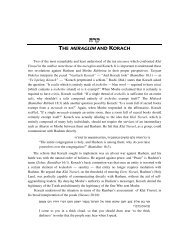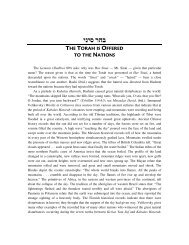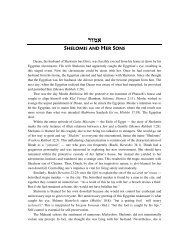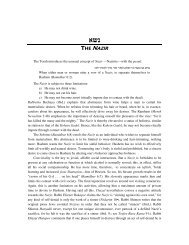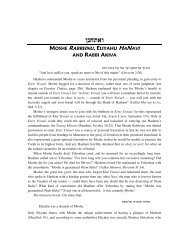Lashon Hara - Parsha Illuminations
Lashon Hara - Parsha Illuminations
Lashon Hara - Parsha Illuminations
Create successful ePaper yourself
Turn your PDF publications into a flip-book with our unique Google optimized e-Paper software.
the manifestation of death in a breathing creature, making the metzora the lowest form of human<br />
existence (see Kuzari III:60).<br />
The Gemara (Sotah 42•) lists four groups of people who will not be privileged to encounter<br />
the Shechinah: the scoffers, the liars, the flatterers, and the purveyors of evil talk. He who speaks<br />
evil is as one who denies the existence of the Almighty (Arachin 15:). The sin is tantamount to<br />
the three cardinal sins: idolatry, incest and murder (ibid.) for which one is responsible to offer his<br />
life in an attempt to avoid trespass. Interestingly, Rabbeinu Yonah (Sha’arei Teshuvah 3:231)<br />
even includes in the category of lashon hara the trait of complaining or whining about life, and he<br />
explains that this group will not be included among those who will be worthy to greet the<br />
Shechinah.<br />
Our sages consider which is the more serious sin: ona’as mamon — vexing one’s fellow man<br />
with money — or ona’as devarim — vexing one’s fellow man with words (Bava Metzia 58:).<br />
They conclude that the sin of vexing with words is associated with the pasuk, “You shall fear<br />
Hashem” (Vayikra 25:17) while monetary vexation is not associated with this pasuk. Also, a<br />
financial crime can always be reversed with compensation, while a verbal crime can never be<br />
completely restituted. Of course, one may apologize for an insult, but complete teshuvah is<br />
impossible. How can one remove the hurt suffered by an insulted fellow man?<br />
The Gemara (Bava Basra 9:) states that there are six blessings rewarded to the giver of<br />
charity, while there are eleven blessings associated with being cordial to a fellow human being.<br />
Hence, greater emphasis is placed on displaying civility to a fellow human being than in even<br />
financially supporting him.<br />
טוב המלבין שינים לחבירו יותר ממשקהו חלב<br />
A sincere smile to a fellow man is more praiseworthy than even feeding him<br />
(Kesubos 111:).<br />
The importance of courteous, civil conduct cannot be overstated, and it is a cornerstone of Torah<br />
existence. The metzora who violates this code of social behavior removes himself from the living<br />
community, and therefore his sin is considered among the vilest and most contemptible. The<br />
contagious aspect of the state of the metzora is his bad behavior — hence, his forced isolation.<br />
The other rite involving the hyssop, was the blood of the karban Pesach at Yetzias Mitzraim.<br />
From time immemorial mankind has sought to identify itself with Hashem via an animal<br />
sacrifice. Kayin and Hevel brought offerings to Hashem (Bereishis 4:3-4), Adam brought<br />
karbanos (Avodah Zarah 8•), Noach offered a sweet savor to Hashem (Bereishis 8:20), and this<br />
was the custom of all mankind through all the generations. All their offerings were burnt<br />
offerings — an offering that was completely consumed by fire. When Klal Yisrael came onto the<br />
scene with their karban Pesach, they were instructed by Hashem to “eat the flesh” of the karban<br />
(Shemos 12:8). This is the first time in human history that a human being had the audacity to<br />
share with Hashem in His karban. Klal Yisrael became, so to speak, partners with Hashem in the<br />
karban. What was up to now totally consumed by fire, could now also be consumed by the<br />
corporeal bodies of Klal Yisrael, and it would be considered as if it were offered up on an altar<br />
completely consumed by fire.<br />
This gives new dimension to the exclamation of Shlomo Hamelech:



